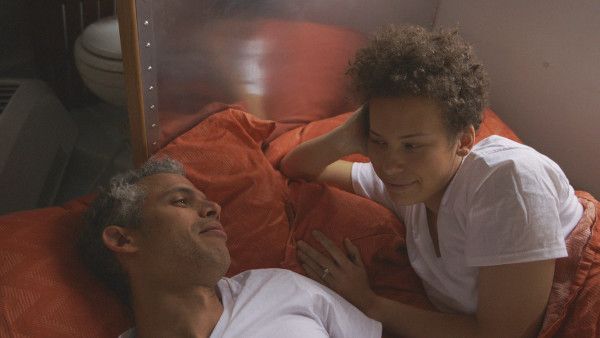Eye For Film >> Movies >> Unrest (2017) Film Review
Unrest
Reviewed by: Amber Wilkinson

The opening moments of Jennifer Brea's powerful and intensely moving documentary could almost have been taken from a found footage horror film. The camera is on the floor and someone (we soon learn it is Brea) is crawling around on the floor, struggling with every movement. It's a shocking moment and marks out Brea's approach to her subject - myalgic encephalomyelitis, otherwise known as ME or, previously, chronic fatigue syndrome - which is to show first, then tell.
Brea doesn't have to explain how life was for her before she was hit by the debilitating condition, she has a wealth of footage to show us of her adventures with her husband Omar Wasow and her friends. Her video diaries these days tell a different story, one in which sudden exhaustion and/or pain and acute light and noise sensitivity, are just some of the symptoms.

As her film goes on to discuss, ME is still in desperate need of further research and remarkably under-funded compared to many other conditions. What is known about it remains limited and it has suffered greatly from a two-fold problem - misdiagnosis, that has often led to those affected being incorrectly branded as having mental health disorders and dismissal by the popular press, which for a long time had a habit of referring to it as 'yuppie flu'. The film also takes time to note that around 85 per cent of cases affect women (a similar statistic to other autoimmune disorders), suggesting that sexism almost certainly played a role in the disease being considered "hysterical" until recent years - a fate also suffered by multiple sclerosis until the advent of the CAT scan. More disturbing, is her exploration of life for a family in Denmark, whose daughter Karina was forcibly institutionalised because of her illness.
Brea weaves together this complex picture, using herself as an illustration but also talking to a number of other sufferers across the globe to talk about the way it is a 'spectrum' illness, with some able to maintain a level of day-to-day normality, while those worst affected may be bed-ridden and unable to communicate. Brea doesn't shy away from the stress ME can put on a relationship, showing intimate moments where she talks about her fears with Omar or noting his own fragility when faced with a wall of sympathy from friends - an emotion many who have loved ones with a chronic condition will no doubt empathise with. She also touches on the high suicide rate among those with the condition.
The chief note here is one of solidarity, as Brea shows the way that technology such as Skype, means some of the many of those with ME worldwide have been able to set up networks to talk to one another and develop activism for the disease. She also documents the Millions Missing protests - which used empty shoes to poignantly illustrate what many with the illness have lost. This isn't just a film to inform those who are lucky enough to know very little about ME, it also serves as a love letter of understanding for those who have it and a call to arms for everyone.
Reviewed on: 10 Oct 2017

















